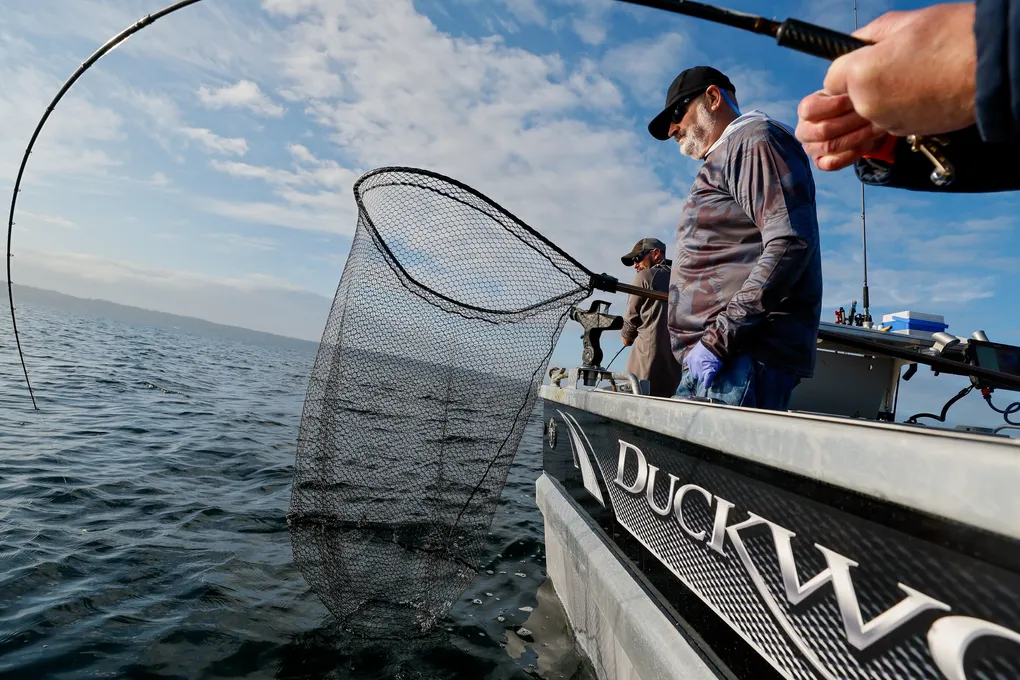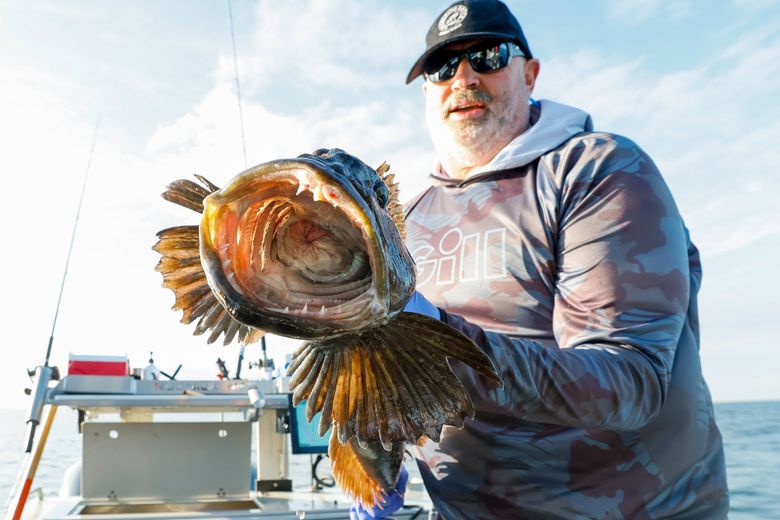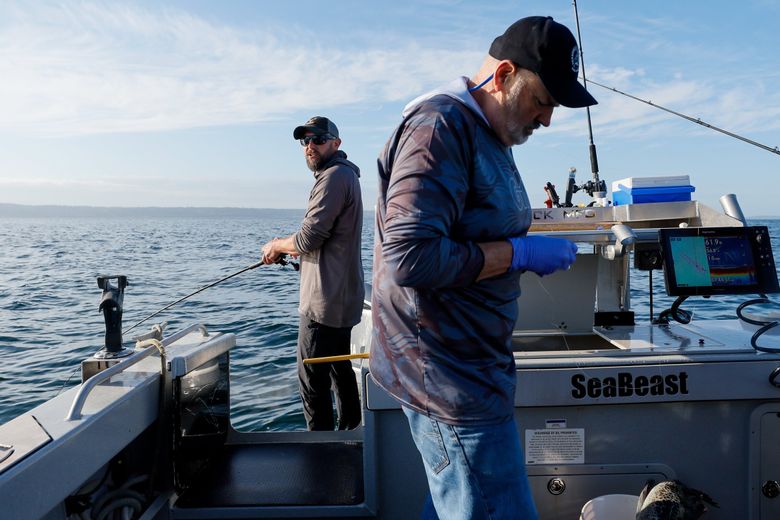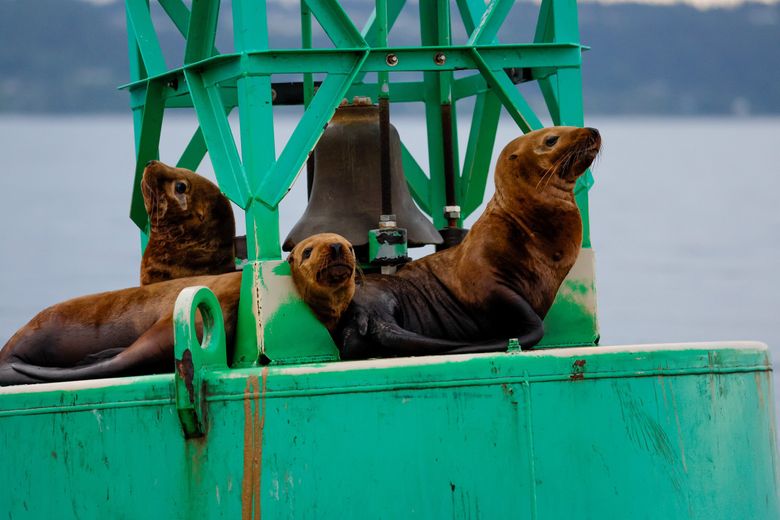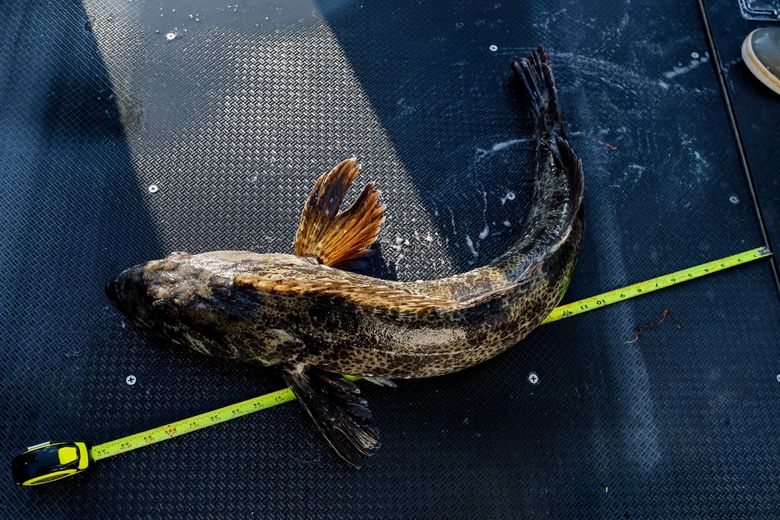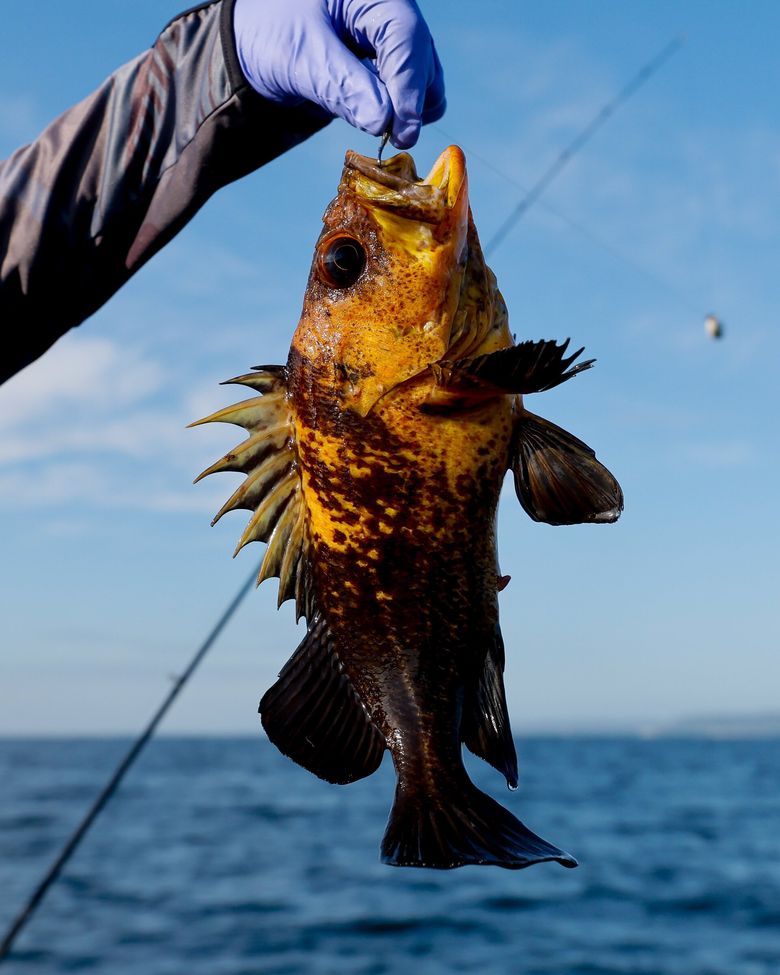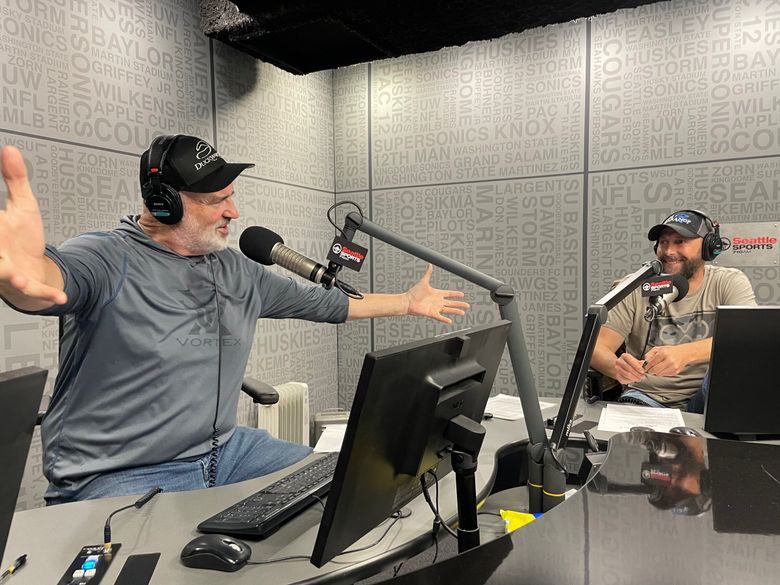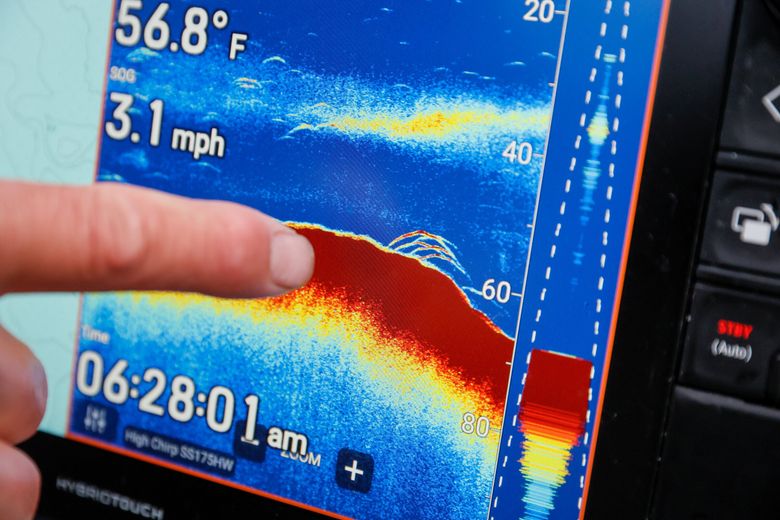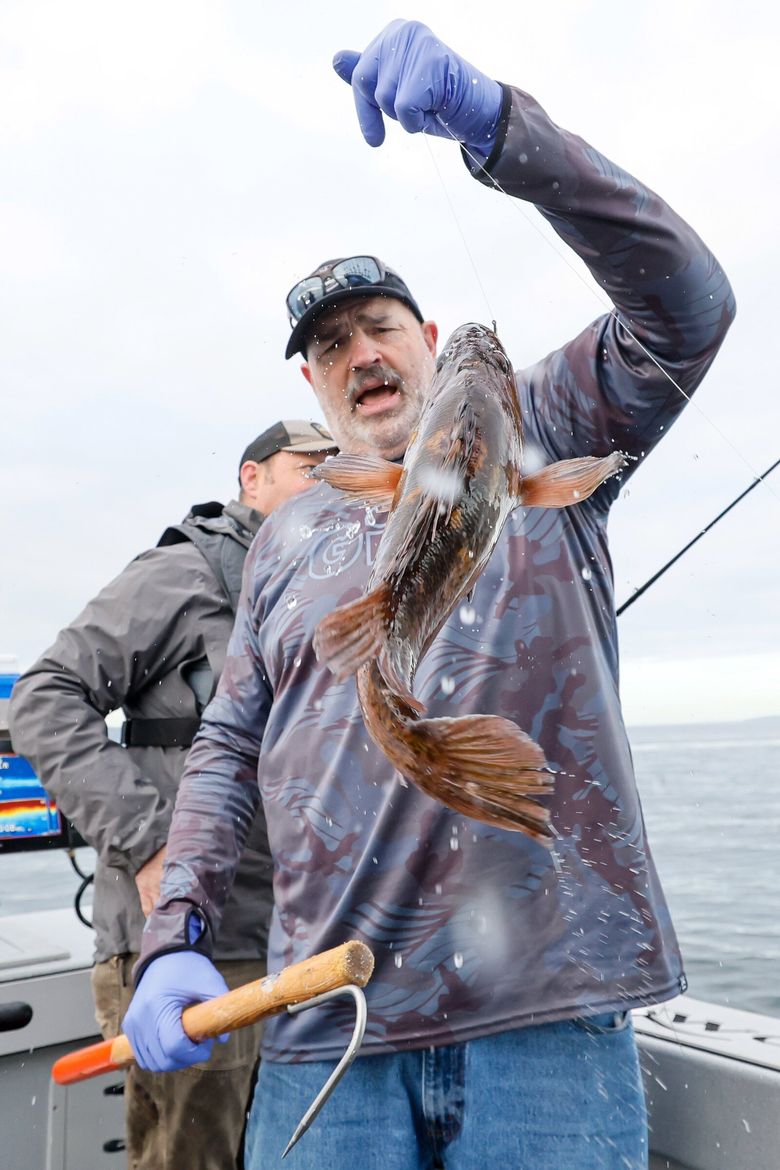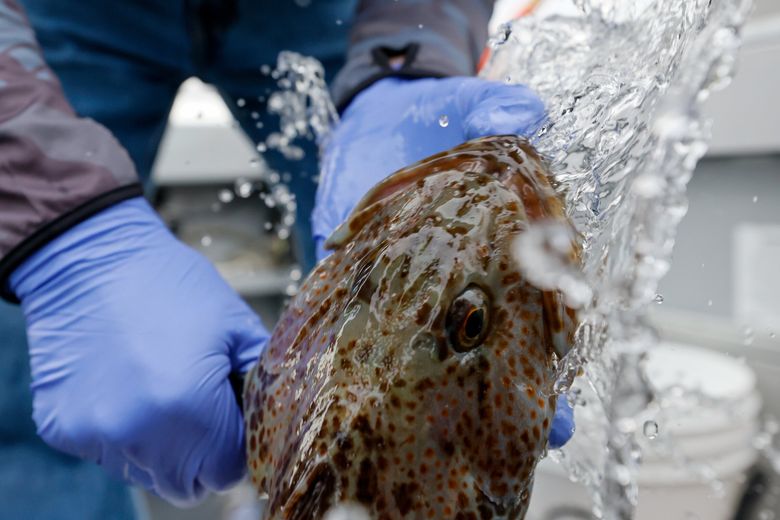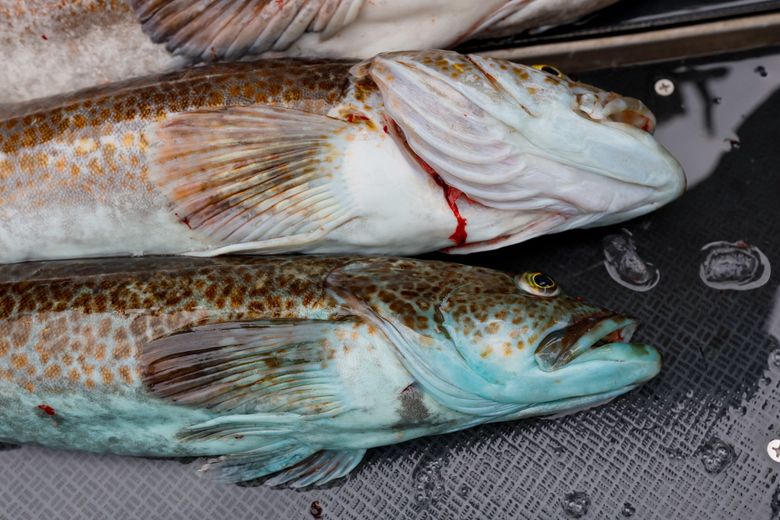Article Summary:
OFF POSSESSION POINT, Puget Sound — As he scrapes a 3-foot gaff hook against an abandoned timber piling, Tom Nelson turns and explains, to a small audience, Puget Sound fishing techniques, the local ecosystem, the modern world.
The barnacles he’s scraping off will chum the water for pile perch. He’ll catch those 2-inch silvery fish, also known as poggies, and use them, live, as bait for bigger quarry. The 3-foot camouflaged lingcod he’ll catch an hour later will, with butter, lemon, maybe some bread crumbs, feed the apex predator at the top of the pyramid.
“We’re just walking up the food chain,” Nelson says.
“This is the real world,” he says, pointing at the saltwater stew of barnacle detritus he’s stirred up. “The rest of this stuff, I-5, Seattle, no, that’s not the real world, you get lost looking at your screens out there.”
For two decades Nelson has been teaching a Seattle audience about “the real world,” for two hours a week, every Saturday morning. On “The Outdoor Line,” Nelson and his co-host Joey Pyburn tell AM radio listeners what’s in season in the Northwest, what’s biting, where it is and how to find it, catch it, kill it and eat it.
The focus is on hunting and fishing in Washington state. The variety and abundance, the specificity, is shocking for the uninitiated.
Lingcod off the shore of Whidbey Island. Muskellunge in Lake Tapps. Black bear near Skykomish. Squid jigging on the Seattle waterfront. Pulling pots for dungies and spot prawns. Steelhead on the Cowlitz. Razor clams on the Olympic Peninsula. Halibut on the coast. Black-tail, white-tail and mule deer. Quail, grouse and pheasant east of the Cascades. And, always, above all else, salmon in coastal rivers and the coves and inlets of Puget Sound.
“When we first got into the radio business, one of the best pieces of advice I ever got was, listen, man, play the hits,” Nelson says. “And around here the straw that stirs that drink is salmon.”
Nelson speaks like someone who’s been catching fish and, more importantly, telling stories about catching fish, for his entire life. He peppers his speech with “fricking” and “dude.” The maritime aphorisms come quick and easy:
“It’s a fish eat fish world.”
“Never leave fish to go find fish.”
“The worst thing you can do for your boat is not use it.”
He talks about Pacific salmon with a kind of hard-boiled awe. Like, even after a lifetime of hooking, catching, gutting, filleting, smoking and eating the fish, he can’t quite believe how wondrous they really are.
“They spawn in fresh water, go out, swim halfway around the fricking planet, right? And come right back here because this is where they need to spawn,” Nelson says. “You know, tuna are great, they’re fun. They’re a lot of fun to catch. But you got to go 30 miles off shore to seek them. Salmon, they come to your neighborhood, dude, you know?”
“They’re a masterpiece, they’re a symphony.”
But wild salmon are disappearing. The threats, the killers, are legion: Warming streams, dammed rivers, an acidifying ocean, impassable culverts, toxins in every tire on every car, stormwater runoff, watersheds choked by sprawl, vanishing floodplains, armored shorelines, abundant sea lions.
There is an intuitive response here: Well, one way to help fish populations would be to stop catching fish. It is one Nelson rejects.
If you shut down fishing, if you “put the salmon in a museum,” Nelson says, the result will be apathy. If people can’t catch salmon, Nelson says, they won’t care about salmon.
For 20 years, as local salmonid counts have waxed and waned, but mostly waned, with 14 separate Washington populations of steelhead, chinook, coho, chum and sockeye on threatened or endangered lists, Nelson has tried to teach people how to catch fish as a means to get them to care about fish.
Radio listeners learn the difference between downrigging and motor mooching. How to fashion and rig a cut-plug herring. The benefits of a circle hook. The importance of zinc anodes on your boat. The time and the place for spoons, flashers, dodgers and hoochies.
“What we have loved,” William Wordsworth wrote, “Others will love, and we will teach them how.”
We will not appreciate, we will not work for, we will not save, what we do not understand. There’s plenty of evidence all around us that understanding and appreciating wild fish will not, by itself, save wild fish. But, for Nelson, it’s a necessary first step.
“Europe, pre-development, had magnificent runs of Atlantic salmon. Extirpated. Wiped ’em out. East coast of the United States: Overdevelopment, poor land-use practices, extirpated Atlantic salmon,” he says. “Now, we see that, and we have a choice here. That’s my fricking goal. Maybe through the radio show to give somebody an experience or give somebody a thought that they want to experience these fish, because you will not care for what you don’t experience. You can’t. How can you?”
“And so some kid wants to go out, catch a trout, catch a bass, then he wants to catch a salmon. It’s like, well, wait a minute, maybe we don’t need to cut all the fricking trees from the hillsides, maybe we don’t need to fricking turn every vacant lot into a fricking parking lot, maybe we can coexist with these wonderful anadromous creatures.”
‘Does everybody you know fish?’
Nelson has a few simple instructions for those he takes fishing.
“0500, Port of Everett,” he barks over the phone. “I only have two rules.”
“No glass bottles, no shelled nuts.”
Pistachio shells, peanut shells can clog a boat’s intake, he says, take down the whole thing.
Nelson and Pyburn have both been fishing since childhood, before they can remember. They fish a lot. Six days a week during summer salmon season.
They take friends, they take friends of friends. They take people who advertise on the radio show. They take employees and friends of people who advertise on the show.
“If you’re going to buy advertising on the show, you’re going to come out, and we’re going to become friends, and we’re going fishing,” Nelson says. “Otherwise, why are you even advertising?”
“Yeah, I mean, Nelly and I are going fishing, whether people come with us or not,” Pyburn says. “We’re not picky, man. If you’ll go fishing with us, we’ll be here.”
For both, it is something between a side hustle, a career and a calling.
Duckworth, a boat manufacturer based in Asotin County, has essentially given Nelson a boat — the SeaBeast, a 30-footer with twin 300-horsepower outboard motors. In exchange, he takes people out on it, sings its virtues and mentions it, copiously, on air. If you’ve bought a Duckworth boat in the last decade, Nelson says, there’s a 75% chance you talked with him about it beforehand. If you’ve bought a 30-foot Duckworth boat, there’s a 75% chance he took you out on the SeaBeast beforehand.
Nelson, 62, grew up in Marysville, fishing the Skagit and the San Juans and everything in between. His dad, a dentist, bought a boat in 1947 at the first ever Seattle Boat Show.
“The joke around my family was they kept me off the water ’til I was 5 weeks old,” he said.
Just before they got married, his soon-to-be wife asked him, “Does everybody you know fish?”
“Why?” he responded. “You know people that don’t fish?”
He majored in fisheries biology at the University of Washington and worked as a fisheries research assistant at the UW before he began a career as a Seattle firefighter.
Nelson worked for the Seattle Fire Department for 25 years, but “every firefighter has a second gig.”
He started guiding on the Skagit. For a 2002 Seattle Post-Intelligencer story on firehouse food, Nelson supplied three sides of salmon. His colleagues’ side dish of Rice-A-Roni was “mortifying.”
He started writing for regional magazines: Fishing & Hunting News, Washington Game & Fish, Salmon Trout Steelheader.
One of his editors hosted a show, “Northwest Wild Country,” on KJR sports radio.
“Dude, it wasn’t very good,” Nelson says.
One weekend, when there was a guest host, “it was even worse, you couldn’t fricking listen.”
So when he submitted his next article, Nelson told his editor what he thought of the show. “If that’s all you got, I’ll come in and do it.” It was meant as an idle offer, but the response was “the show’s all yours this weekend.”
Nelson called his college roommate and fishing buddy, Kevin Gogan, a UW football legend, three-time Pro Bowler and two-time Super Bowl champion. Gogan, in turn, called his buddy and former Dallas Cowboys teammate, Hall of Famer Troy Aikman, who happened to be fishing on Lake Fork, in Texas, that weekend.
Gogan co-hosted, Aikman called in as a guest, the two-hour show “went by super fricking fast,” and Nelson was offered a permanent co-host spot.
“I go, cool, OK, yeah, that’s fine, what’s it pay?” he said. “Well do you remember that line from ‘Caddyshack‘? ‘Oh, there won’t be any money, but when you die, on your deathbed, you’ll receive eternal consciousness.’”
He co-hosted for about five years before jumping to KIRO in 2009 to start “The Outdoor Line,” with Rob Endsley and former Seahawk Robbie Tobeck. Pyburn came on board about a decade later, eventually becoming the full-time co-host when Endsley stepped aside.
Pyburn, 48, grew up on Whidbey Island. He started as a fishing guide right out of high school, working in Alaska for five years and eventually guiding in Russia on the Kamchatka Peninsula.
About a decade ago he and his cousin took over the family business, Ray’s Bait, catching and processing bait fish (herring, sardines, squid) to sell at tackle shops around the region.
Nelson and Pyburn spend the days before each show reading state Fish and Wildlife catch reports, talking to anglers, guides, fly shop owners, sussing out what’s happening on the water.
“The information network,” Nelson says. “I know all the charter guys, all the fishing degenerates.”
They also just kind of know, after a lifetime on the water, what to talk about. There is a rhythm to the seasons, as sure as cherry blossoms mark the spring and golden larches herald the fall. Razor clams in April. Lingcod in May. Salmon in June. Crab in July.
Nelson sees us as part of that rhythm, as the apex predator on that food chain, from barnacle to poggy to lingcod to dinner table.
“I don’t know about you, but I’m part of this ecosystem,” he says. “Every single animal on the planet exists by eating another organism. If you like it, if you hate it, I’m sorry, but that’s life.”




